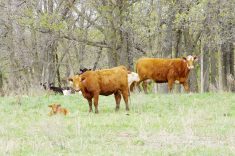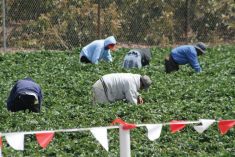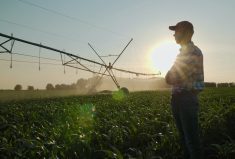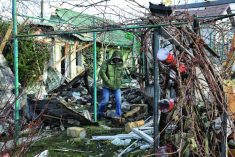For most farm kids, taking over the family farm is a once-in-a-lifetime opportunity that’s too good to pass up.
But for Jay Bruggencate and Mike Sulzle, it was a second chance that drew them back into farming — just not on their own family farms.
Both men had “missed the window” to go back to their own family operations. And with the rising cost of land and equipment, neither could see a way to farm on their own. So Bruggencate began working as an independent agronomy consultant while Sulzle worked as a hired man at Durango Farms for the past 16 years.
It was Durango Farms that gave the pair their twice-in-a-lifetime opportunity to farm.
The operation, just outside of Lacombe, had been in the Shaw family for a century. But when brothers Craig and Gary Shaw decided to retire in 2016 with no one able to come back to the farm, they offered their longtime agronomist and employee a unique opportunity — to join forces and take over the operation.
“They asked if we wanted to give it a shot, and we jumped on the opportunity,” said Bruggencate, who now co-owns Vector Grain with wife Jennifer, Sulzle, and Sulzle’s wife Kelly.

“We’re both passionate about farming and agriculture. It’s something that Mike’s always wanted to do and I’ve always wanted to do. And we knew it was an opportunity that wasn’t going to come around again.”
But a farm transfer and succession plan with three non-family members is an unusual thing in an industry where most farms are passed down through the generations. In fact, in his nearly 15 years of facilitating farm successions, Reg Shandro has only ever seen it done successfully once — at Vector Grain.
“This was the very first one that had all the I’s dotted and T’s crossed in a formal agreement and the proper team to succeed,” said Shandro, owner of Farmacist Advisory Services.
Read Also
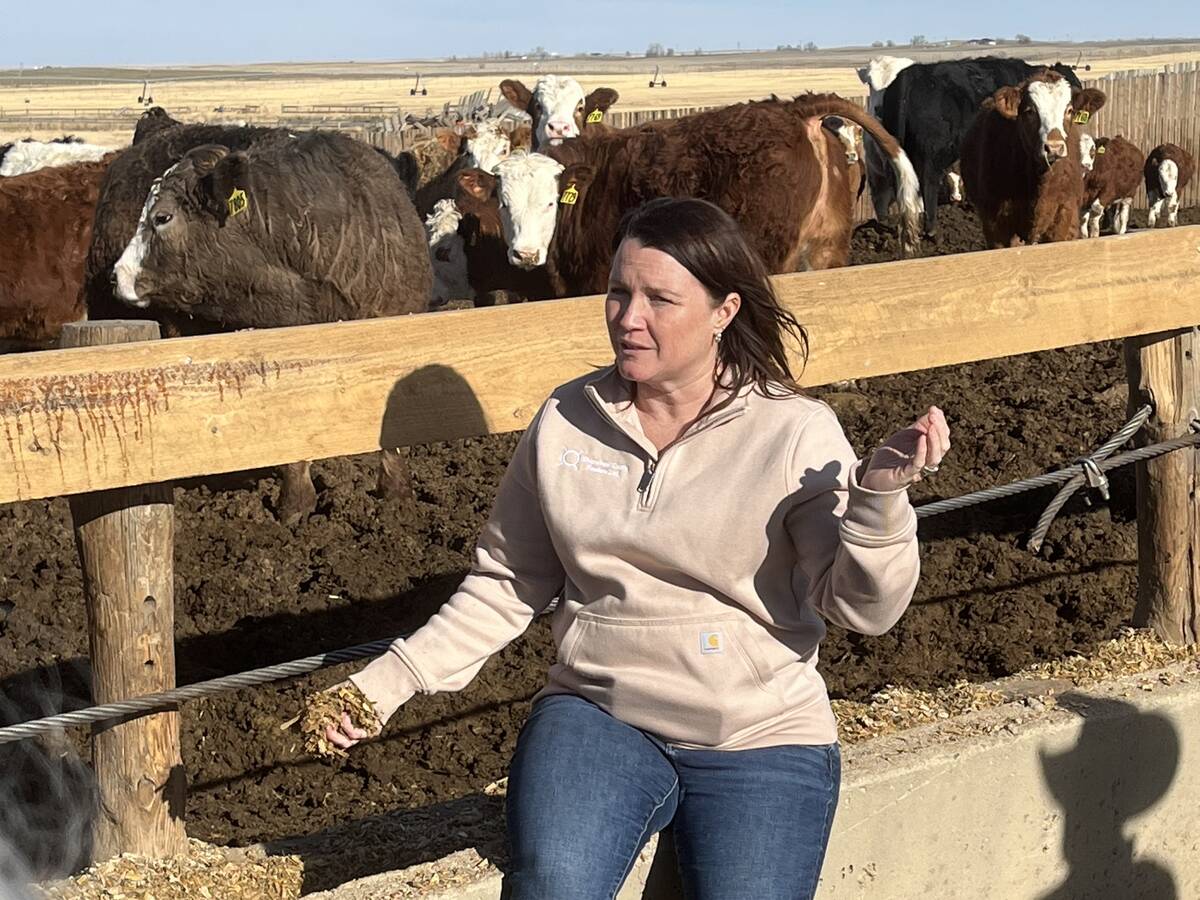
Roots of Resilience: The 50-year evolution of Shipwheel Cattle Feeders
Alberta’s Shipwheel Cattle Feeders is one of Canada’s pioneers in holistic regenerative agricultural practices.
“When I initially had my meetings with them, there was a lot of promise for the future, and now they’ve proven that they can do some very good things.”
Non-family joint ventures
Most non-family farm transfers fizzle out before they even get going, said Shandro. Even as rural populations shrink and fewer people decide to come back to the family farm, most farmers want to keep the land in the family if they can.
“Blood is thicker than water, and the legacy of the farm continuing is important,” he said. “A lot of people say that they’ll just find someone to continue.
“But at the end of the day, usually the farm has to be sold to their own children for economic reasons instead of to somebody else.”

And Shandro doesn’t see that trend changing any time soon.
“I don’t think the situation around agriculture — or people — has changed that much, so I don’t think we’ll see any kind of mass change in these trends,” said Shandro, who is working on another farm transfer like this right now.
“I don’t think there’s going to be a lot of instances of these types of partnerships.”
But Vector Grain is bucking the trend through its joint venture.
“Agriculture is based on competitiveness, and a pooled effort allows you to be competitive in this world of ours,” said Merle Good, owner of GRS Consulting. “The point of a joint venture is to increase profitability through the combined efforts of one or more people by contributing the use of their assets, labour, and management.
“It’s all about scale. If you have two or three people agree to agree, then they can reduce their costs.”
Joint ventures are a little complicated, but they’re best defined by what they’re not, said Good. “It’s not a partnership, nor is it a company. It’s simply an agreement to agree.”
Under a joint venture, two or more people pool their resources — land, equipment, labour — to share the risks and returns of starting a new operation. The joint venture itself doesn’t own any assets; it simply allows the use of an asset for the operation.
In this case, that means both the Bruggencates and the Sulzles each own their own companies under the umbrella of Vector Grain, along with a company that owns the equipment purchased from the Shaws. The Shaws have also acted as silent partners in the joint venture, with Craig leasing his equipment to the group and Gary selling his home to the Sulzles.
“What’s positive about that is, since the joint venture doesn’t own any assets, it’s very easy to withdraw without any adverse income tax consequences,” said Good.
“All you’re doing is agreeing to agree.”
This type of arrangement is becoming increasingly popular among parents and children who farm together to “operate under one agronomic mind,” but still have separate businesses for asset ownership. But it’s also very complex, and there’s no one-size-fits-all approach.
“These structures assist in competitiveness. They assist in economies of scale. But they’re also complex,” said Good. “It sounds easy to say, ‘Let’s agree to agree.’ But it’s not that simple.”
Because of that, Good likes to use them as a “training ground before you go full bore.”
“I like them for testing the waters, especially for the first two or three years, to see how they get along,” he said.
“That’s why I think a joint venture is good — you’re not sharing any ownership yet. If it doesn’t work out, you can just pack up your equipment and go home. You’re just tentatively putting a toe in the water.”
Building soft skills
For people who want to farm and don’t have a family farm to take over, this type of partnership can offer them that opportunity — if they can let go of control.
“People have to put their egos on the shelf,” said Shandro. “Most of these things implode because of egos and people who aren’t willing to change.”
That’s been a challenge at Vector Grain as the two families worked to get it up and running over the past three years.
“We’ve had to get a feel for decision-making and communication and all those types of things that constantly have to be thought about and worked at,” said Bruggencate. “It doesn’t just happen on its own. You’ve got to work at it.”
For some farm families, figuring out those group dynamics can be trickier than dealing with the stacks of paperwork that come with a farm transfer.
“This particular operation is textbook when it comes to farm management and doing things the way they’re supposed to be done as a business,” said Shandro.
“They’re doing fundamental farm management practices — having meetings, communicating well, formalizing arrangements, exploring each other’s ideas, being respectful.
“If there wasn’t trust and respect, this wouldn’t have got going.”
Bruggencate credits that success to his strong partnership with Sulzle.
“There’s got to be willing partners and a willing partnership for something like our situation to work,” he said. “I think that’s the key and the whole foundation of the idea.”
Both men also brought different strengths to the table. While they work together on seeding, spraying, and harvest operations, Sulzle manages the operational logistics, while Bruggencate takes care of the accounting, marketing and agronomy.
“We each know what our roles and responsibilities are, and we focus on those,” said Bruggencate. “We have well-defined roles, and we respect each other’s decisions within those roles. We each let the other party lead when it comes to making those decisions and implementing them.”
That’s part of what makes this partnership work, said Shandro.
“It was the perfect fit,” he said. “They knew they couldn’t be all things to all people, and each of them brought something to the table that created synergies. Jay is an amazing businessman, and Mike’s an amazing production farmer. They didn’t duplicate their skill sets.”
Paying for professional advice
But they also knew they couldn’t do it alone. In creating their joint venture, they worked with a team of advisers, including a lawyer, an accountant, a tax planning expert (Good), and a succession planning expert (Shandro).
Having that right mix of skills and experience was essential, said Bruggencate.
“They helped with opening up the breadth of possibilities on how things can be done and getting innovative ideas on how to go about these transitions,” he said. “They gave us advice on how to make it viable long term — to set ourselves up to succeed and not fail, basically.”
Most farmers, said Shandro, know what they know and figure that they’ll figure out what they don’t. That can be an expensive mistake, he said.
“Farmers are traditionally very conservative when it comes to expenditures, so they try to become all things to all people,” he said. “They try to become the lawyer, they try to become the accountant. But there’s so much expertise needed on a farm that it would take you 20 years of schooling to even begin.”
In some cases, it can be hard to put a dollar figure on the value these types of advisers provide, but their help can be a good investment if you want to avoid a bigger bill down the road.
“These guys are smart enough to know that they’ll spend $5,000 on planning, and then they don’t have to worry about fighting some kind of discrepancy for $50,000,” said Shandro.
“People want to cut costs to save money. For some of this stuff, though, you can’t quantify the benefit, but the benefit is there.”
And at Vector Grain, that professional advice has been priceless in making their joint venture work.
“These succession advisers have seen a lot work and seen a lot fail,” said Bruggencate. “I’m glad we called on succession advice in order to capitalize on their experiences.”




